FINANCIAL ALIYAH: TIPS FOR NEW OLIM
Earlier this week I celebrated the 20th anniversary of my arrival in Israel. I came straight out of university and landed here with no job, no wife and no real idea of what it was like to live in Israel. After 20 years I am happy to say that I have a job, a beautiful wife and five great kids – and no real idea of what it’s like to live in Israel! Just kidding. While my kids all make fun of my Hebrew, I have managed to get by and establish my roots here.
This week also marks the culmination of another incredible summer of aliyah brought to us by Nefesh B’Nefesh. More than 2,500 olim this summer and over 30,000 in a decade is a huge accomplishment. Along with support from the Jewish Agency, Friends of the IDF and the Immigrant Absorption Ministry, Nefesh B’Nefesh has managed to prepare olim for the trials and tribulations of making aliyah. From helping them find employment, a community to live in and a built-in support system, the model must be working because they are sporting a 90%-plus success rate of olim staying, while about 50% of my friends and acquaintances from 20 years ago are still here. Not bad! While they do a great job of preparing olim, from my experience as a financial adviser, the one issue that gets lost in the aliyah process is how to deal with investments. After all, getting children acclimated in a new school and learning a new language is more sensitive than whether to buy of sell shares of IBM.
That being said, if I can give a tip based on my 20 years of living here and professionally working with olim, it’s to take care of your finances. I can’t tell you how many veteran olim I have met who neglected their finances and are now paying the price.
Here are a few tips that will make your financial aliyah a bit easier.
Tip No. 1: Diversify currency
For olim living off their investments abroad, it’s very important to have some non-US dollar exposure. Shekel strengthening can adversely impact your revenue stream and even put your aliyah in jeopardy.
Let’s look at a real-life example. A few years ago a retired couple came with $1 million thinking that they needed to generate $40,000 a year to supplement their pension and Social Security.
In local terms they had NIS 4 million, and it was little problem to generate the money needed. Then in the span of six months the shekel strengthened by 20 percent, and all of the sudden there were issues.
Why? Because in local terms that $1m. was now worth $800,000 and to generate the money needed became more difficult.
The millionaire was able to weather the storm, but the oleh with $300,000 to $500,000 who suddenly lost 20% of his net worth in a few months because of currency movement was stuck. Speak to a financial adviser with experience in these issues to make sure that you are protected.
Tip No. 2: Keep your IRA current
One of the most common issues I see when I meet with prospective clients is that they haven’t looked at their IRAs (Individual Retirement Account) or 401ks in years. The thought process is usually that since this money is for retirement there is no sense in doing anything about it now anyway and there are more pressing issues at hand. Olim tend to forget about these accounts altogether, only to wake up in a decade or so to realize that the value of their account is the same as it was pre-aliyah.
Recently at a wedding I started up a conversation at the smorgasbord with an English speaker. After some small talk he asked me what I do for a living. I told him that I am a financial adviser.
He then proceeded to fill me in on his financial situation. (I guess it is customary to give free financial advice while filling up a plate with roast beef and schnitzel fingers!) He said he made aliyah about 14 years ago. He came with a couple hundred thousand dollars, which he liquidated to buy an apartment. He told me the biggest mistake he made was with his IRAs. He had one worth about $65,000 and his wife had about $30,000. He said he basically left them alone and never made any changes. Well, 14 years later and they are still worth the same amount of money.
I can’t tell you how many times I have heard similar stories. If you have a long-term savings account and you never look at it, you are doing yourself a disservice.
I know it’s tough, but take some time to get your financial aliyah in order as well. It will save you a lot of money down the road.
Good luck and welcome to Israel!
The information contained in this article reflects the opinion of the author and not necessarily the opinion of Portfolio Resources Group, Inc. or its affiliates.
Aaron Katsman is author of the book Retirement GPS: How to Navigate Your Way to A Secure Financial Future with Global Investing (McGraw-Hill), and is a licensed financial professional both in the United States and Israel, and helps people who open investment accounts in the United States. Securities are offered through Portfolio Resources Group, Inc. (www.prginc.net). Member FINRA, SIPC, MSRB, SIFMA. For more information, visit www.aaronkatsman.com or email aaron@lighthousecapital.co.il.







